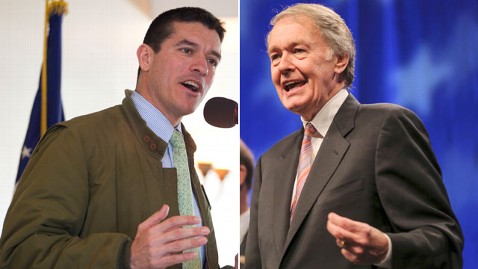Ed Markey, Gabriel Gomez Win Senate Primaries in Massachusetts

Image credit: Boston Globe/Getty Images (2)
Democratic U.S. Rep. Ed Markey, D-Mass., and Republican businessman Gabriel Gomez are the winners in Tuesday's primary for the special election to fill the U.S. Senate seat vacated when John Kerry became Secretary of State.
Markey, a House member since 1976, bested U.S. Rep Stephen Lynch, D-Mass., and Gomez beat out former acting ATF director and former U.S. Attorney Michael Sullivan, as well as state legislator and former general counsel to Mitt Romney, Dan Winslow, the Associated Press determined.
Markey and Gomez will face off in the general election on June 25.
Markey was heavily favored to beat Lynch and had the backing of establishment Democrats in the state.
"On the Democratic side, it's a decisive victory for Ed Markey and, for all intents and purposes, he was the official Democratic nominee although the party was ostensibly neutral," Tufts political science professor Jeffrey Berry told ABC News.
Lynch was the more conservative Democrat and tried to appeal to more blue-collar Democratic voters, but he was also up against Markey's well-organized machine.
"[Markey's] vote margin reflects the power of his organization as well as fits with the liberal electorate who went to the polls," Berry said, noting Markey's "organization has to be a worry to Republicans who lack the manpower to match the Democrats' firepower in terms of organization."
Gomez, a Latino businessman in the state and a former Navy SEAL with a Harvard MBA, is a political newcomer, but his moderate appeal won over voters in blue Massachusetts. Although Markey will be heavily favored to win the general election, Berry said it will be a real fight despite Markey's organization.
"This is a very impressive victory for Gabriel Gomez, who literally came out of nowhere to power past Michael Sullivan and Dan Winslow," Berry said. "He won largely on the basis of personal appeal. He seems like a fresh face and someone who is likely to give the Democrats a challenge come two months hence."
Sullivan was more conservative than both Gomez and Winslow, and his opponents eagerly pointed out that he wasn't in lockstep with the average Massachusetts voter. But it was Winslow - also a moderate - who had the backing of almost every newspaper in the state, including the Boston Globe and the Boston Herald, two newspapers that rarely agree on anything.
"Winslow never seemed to catch on with the Republican electorate," Berry said. "I think he's well respected but, somehow, the typical Republican voter didn't seem that excited for him. He fit the Republican electorate well, but I think he lost out on the personality contest to Gabriel Gomez. He came across as much more of an appealing candidate. I know Winslow has a very good reputation in the state legislature as a thoughtful, non-ideological legislator, but somehow that didn't translate into enough primary votes."
The primary was very much overshadowed by the April 15 Boston Marathon bombing and the manhunt for the suspects that left four dead and more than 260 injured.
However, even before the attacks, interest wasn't high in the special election to fill the Senate seat vacated by Kerry, and turnout Tuesday was low.
"Certainly, it has been overshadowed in the sense that the drama and the pain of the April 15 bombing made it look less important but, on the other hand, no one was paying attention to [the special election] before the bombing," Berry said. "The race hasn't gained traction and this added to that."
All five of the candidates suspended campaigning for the week after the bombings and have had to figure out the delicate balance since they started up again. Berry chalked up the lack of interest not just to the bombings, but to election fatigue for Bay State residents, who have endured the 2010 special U.S. Senate election, the 2010 gubernatorial election, a 2012 U.S. Senate election and the 2012 presidential election.
ABC News' Rick Klein contributed to this report.